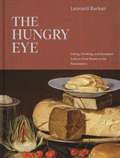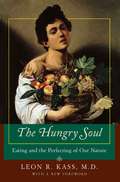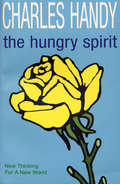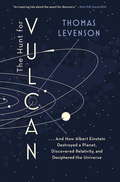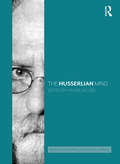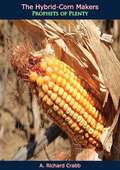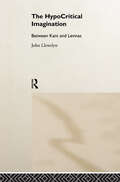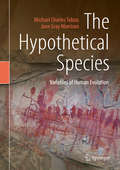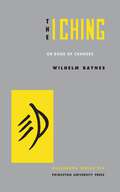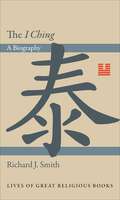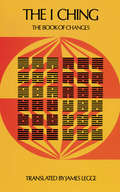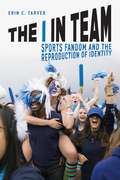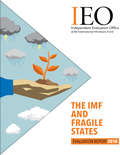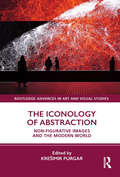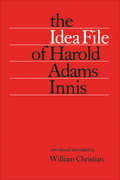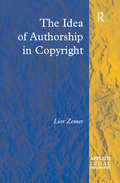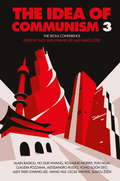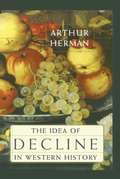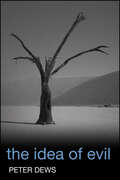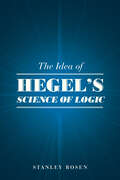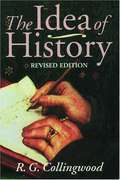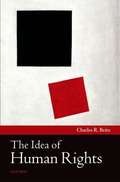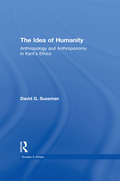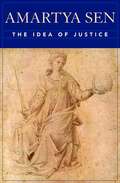- Table View
- List View
The Hungry Eye: Eating, Drinking, and European Culture from Rome to the Renaissance
by Leonard BarkanAn enticing history of food and drink in Western art and cultureEating and drinking can be aesthetic experiences as well as sensory ones. The Hungry Eye takes readers from antiquity to the Renaissance to explore the central role of food and drink in literature, art, philosophy, religion, and statecraft.In this beautifully illustrated book, Leonard Barkan provides an illuminating meditation on how culture finds expression in what we eat and drink. Plato's Symposium is a timeless philosophical text, one that also describes a drinking party. Salome performed her dance at a banquet where the head of John the Baptist was presented on a platter. Barkan looks at ancient mosaics, Dutch still life, and Venetian Last Suppers. He describes how ancient Rome was a paradise of culinary obsessives, and explains what it meant for the Israelites to dine on manna. He discusses the surprising relationship between Renaissance perspective and dinner parties, and sheds new light on the moment when the risen Christ appears to his disciples hungry for a piece of broiled fish. Readers will browse the pages of the Deipnosophistae—an ancient Greek work in sixteen volumes about a single meal, complete with menus—and gain epicurean insights into such figures as Rabelais and Shakespeare, Leonardo and Vermeer.A book for anyone who relishes the pleasures of the table, The Hungry Eye is an erudite and uniquely personal look at all the glorious ways that food and drink have transfigured Western arts and high culture.
The Hungry Mind
by Susan EngelDespite American education's mania for standardized tests, testing misses what matters most about learning: the desire to learn in the first place. Susan Engel offers a highly readable exploration of what curiosity is, how it can be measured, how it develops in childhood, and how educators can put curiosity at the center of the classroom.
The Hungry Soul: Eating And The Perfecting Of Our Nature
by Leon KassThe Hungry Soul is a fascinating exploration of the natural and cultural act of eating. Kass brilliantly reveals how the various aspects of this phenomenon, and the customs, rituals, and taboos surrounding it, relate to universal and profound truths about the human animal and its deepest yearnings.
The Hungry Spirit: New Thinking for a New World
by Charles HandyWith his characteristically very personal anecdotal style, Charles Handy analyses how materialistic capitalism is self-limiting, how efficiency may be the enemy of a cohesive society, and examines the false certainties of science and religion. Offering a carefully considered and compelling alternative vision, the book challenges the status quo on everything from capitalism and organization to goal-setting and morality. With nods to Kant, Keynes, Sartre and Drucker, The Hungry Spirit is not your usual business tome, but that, of course, is part of Handy's plan.
The Hunt for Vulcan: . . . And How Albert Einstein Destroyed a Planet, Discovered Relativity, and Deciphered the Universe
by Thomas LevensonThe captivating, all-but-forgotten story of Isaac Newton, Albert Einstein, and the search for a planet that never existed For more than fifty years, the world's top scientists searched for the "missing" planet Vulcan, whose existence was mandated by Isaac Newton's theories of gravity. Countless hours were spent on the hunt for the elusive orb, and some of the era's most skilled astronomers even claimed to have found it. There was just one problem: It was never there. In The Hunt for Vulcan, Thomas Levenson follows the visionary scientists who inhabit the story of the phantom planet, starting with Isaac Newton, who in 1687 provided an explanation for all matter in motion throughout the universe, leading to Urbain-Jean-Joseph Le Verrier, who almost two centuries later built on Newton's theories and discovered Neptune, becoming the most famous scientist in the world. Le Verrier attempted to surpass that triumph by predicting the existence of yet another planet in our solar system, Vulcan. It took Albert Einstein to discern that the mystery of the missing planet was a problem not of measurements or math but of Newton's theory of gravity itself. Einstein's general theory of relativity proved that Vulcan did not and could not exist, and that the search for it had merely been a quirk of operating under the wrong set of assumptions about the universe. Levenson tells the previously untold tale of how the "discovery" of Vulcan in the nineteenth century set the stage for Einstein's monumental breakthrough, the greatest individual intellectual achievement of the twentieth century. A dramatic human story of an epic quest, The Hunt for Vulcan offers insight into how science really advances (as opposed to the way we're taught about it in school) and how the best work of the greatest scientists reveals an artist's sensibility. Opening a new window onto our world, Levenson illuminates some of our most iconic ideas as he recounts one of the strangest episodes in the history of science. Advance praise for The Hunt for Vulcan "This delightful and enlightening drama tells the story of the hunt for a planet that did not exist and how Einstein resolved the mystery with the most beautiful theory in the history of science. The Hunt for Vulcan is an inspiring tale about the quest for discovery and the challenges and joys of understanding our universe."--Walter Isaacson "The Hunt for Vulcan is equal to the best science writing I've read anywhere, by any author. Beautifully composed, rich in historical context, deeply researched, it is, above all, great storytelling. Levenson gives a true picture of the scientific enterprise, with all its good and bad guesses, wishful thinking, passion, human ego, and desire to know and understand this strange and magnificent cosmos we find ourselves in."--Alan Lightman, author of The Accidental Universe "The forgotten story of Vulcan could no longer remain untold. Levenson tells us where it came from, how it vanished, and why its spirit lurks today. Along the way, we learn more than a bit of just how science works--when it succeeds as well as when it fails."--Neil deGrasse Tyson "Levenson's brilliance as a writer is in setting the evolution of scientific ideas into their appropriate historical contexts, allowing us to see their wider implications."--Lisa Randall, professor of physics, Harvard University, and author of Dark Matter and the Dinosaurs "The Hunt for Vulcan is science writing at its best. This book is not just learned, passionate, and witty--it is profoundly wise."--Junot DíazFrom the Hardcover edition.
The Husserlian Mind (Routledge Philosophical Minds)
by Hanne JacobsEdmund Husserl (1859-1938) is widely regarded as the principal founder of phenomenology, one of the most important movements in twentieth-century philosophy. His work inspired subsequent figures such as Martin Heidegger, his most renowned pupil, as well as Jean-Paul Sartre and Maurice Merleau-Ponty, all of whom engaged with and developed his insights in significant ways. His work on fundamental problems such as intentionality, consciousness, and subjectivity continues to animate philosophical research and argument. The Husserlian Mind is an outstanding reference source to the full range of Husserl's philosophy. Forty chapters by a team of international contributors are divided into seven clear parts covering the following areas: major works phenomenological method phenomenology of consciousness epistemology ethics and social and political philosophy philosophy of science metaphysics. Contained in these sections are chapters on many of the key aspects of Husserl's thought, including intentionality, transcendental philosophy, reduction, perception, time, self and subjectivity, personhood, logic, psychology, ontology, and idealism. Offering an unparalleled guide to the enormous range of his thought, The Husserlian Mind is essential reading for students and scholars of Husserl, phenomenology, and the history of twentieth-century philosophy. It will also be of interest to those in related fields in the humanities, social sciences, and psychology and the cognitive sciences.
The Hybrid-Corn Makers: Prophets of Plenty
by A. Richard CrabbLong before history began to be recorded, man strove constantly to get plants that would produce greater amounts of food with less labor. Sometimes he obtained this improvement by increasing the food-producing ability of an existing plant, at other times by selecting a more capable new plant. Hybrid corn is the greatest example in recent time of increasing the value of a food-bearing plant by improving one already in common use. The development of hybrid corn is truly one of the most important advances made in all the thousands of years since man first began cultivating special food-bearing plants.What is hybrid corn, and how does it differ from the corn grown before it was developed?
The Hypocritical Imagination: Between Kant and Levinas (Warwick Studies in European Philosophy)
by John LlewellynFor philosophers such as Kant, the imagination is the starting point for all thought. For others, such as Wittgenstein, what is important is only how the word 'imagination' is used. In spite of the attention the imagination has received from major philosophers, remarkably little has been written about the radically different interpretations they have made of it.The HypoCritical Imagination: Between Kant and Levinas is an outstanding contribution to this vaccuum. Focusing on Kant and Levinas, John Llewelyn takes us on a dazzling tour of the philosophical imagination. He shows us that despite the different treatments they accord to the imagination, there is much to be gained from comparing these two key thinkers. From Kant, Llewelyn shows how the imagination is the common root of all understanding. He contrasts this with the thought of Emmanuel Levinas, for whom the imagination plays an ambivalent role both as necessary for and a threat to recognition of the other.John Llewelyn also introduces the importance of the work of Heidegger Schelling, Hegel, Arendt and Derrida on the imagination and what this work can tell us about the relationship between the imagination and ethics, aesthetics and literature.The HypoCritical Imagination: Between Kant and Levinas is a brilliant reading of a neglected but important philosophical theme and is essential reading for those in contemporary philosophy, art theory and literature.
The Hypothetical Species: Variables of Human Evolution
by Michael Charles Tobias Jane Gray MorrisonThis book is a provocative and invigorating real-time exploration of the future of human evolution by two of the world’s leading interdisciplinary ecologists – Michael Charles Tobias and Jane Gray Morrison. Steeped in a rich multitude of the sciences and humanities, the book enshrines an elegant narrative that is highly empathetic, personal, scientifically wide-ranging and original. It focuses on the geo-positioning of the human Self and its corresponding species. The book's overarching viewpoints and poignant through-story examine and powerfully challenge concepts associated historically with assertions of human superiority over all other life forms. Ultimately, The Hypothetical Species: Variables of Human Evolution is a deeply considered treatise on the ecological and psychological state of humanity and her options – both within, and outside the rubrics of evolutionary research – for survival. This important work is beautifully presented with nearly 200 diverse illustrations, and is introduced with a foreword by famed paleobiologist, Dr. Melanie DeVore.
The I Ching or Book of Changes: Or Book Of Changes (Bollingen Series #170)
by Richard WilhelmThe bestselling English translation of the ancient classic of Chinese divination that has inspired millions with its timeless insights into the changing nature of all existenceThe I Ching, or Book of Changes, has exerted a living influence in China for thousands of years. Today, it continues to enrich the lives of readers around the world. First set down in the dawn of history as a book of oracles, it grew into a book of wisdom with the inclusion of commentaries on its oracular pronouncements, eventually becoming one of the Five Classics of Confucianism and providing a common source for both Confucianist and Taoist philosophy. This edition of the I Ching is the most authoritative and complete translation available, preserving the spirit of the ancient text while providing a vital key for anyone who seeks to live harmoniously with the immutable law of change.The book presents the sixty-four hexagrams of the I Ching along with their texts and interpretations in a format especially designed for easy reference. Unlike many editions of the I Ching, it also features the Ten Wings, supplemental writings traditionally ascribed to Confucius that provide indispensable insights into the symbolic structure of the hexagrams and their place in a cosmology where change is the only constant.With an illuminating foreword by C. G. Jung and an informative introduction by Richard Wilhelm, this beautiful edition of the I Ching shares the essence of wisdom and a true understanding of life.
The I Ching: A Biography (Lives of Great Religious Books #9)
by Richard J. SmithHow the I Ching became one of the most widely read and influential books in the worldThe I Ching originated in China as a divination manual more than three thousand years ago. In 136 BCE the emperor declared it a Confucian classic, and in the centuries that followed, this work had a profound influence on the philosophy, religion, art, literature, politics, science, technology, and medicine of various cultures throughout East Asia. Jesuit missionaries brought knowledge of the I Ching to Europe in the seventeenth century, and the American counterculture embraced it in the 1960s. Here Richard Smith tells the extraordinary story of how this cryptic and once obscure book became one of the most widely read and extensively analyzed texts in all of world literature.In this concise history, Smith traces the evolution of the I Ching in China and throughout the world, explaining its complex structure, its manifold uses in different cultures, and its enduring appeal. He shows how the indigenous beliefs and customs of Japan, Korea, Vietnam, and Tibet "domesticated" the text, and he reflects on whether this Chinese classic can be compared to religious books such as the Bible or the Qur'an. Smith also looks at how the I Ching came to be published in dozens of languages, providing insight and inspiration to millions worldwide—including ardent admirers in the West such as Leibniz, Carl Jung, Philip K. Dick, Allen Ginsberg, Hermann Hesse, Bob Dylan, Jorge Luis Borges, and I. M. Pei. Smith offers an unparalleled biography of the most revered book in China's entire cultural tradition, and he shows us how this enigmatic ancient classic has become a truly global phenomenon.
The I Ching: The Book of Changes
by James LeggeOne of the most important books in the history of Oriental culture is the I Ching, or as it is usually called in English, the Book of Changes. Its basic text seems to have been prepared before 1,000 B.C., in the last days of the Shang Dynasty and the first part of the Chou Dynasty. It was one of the Five Classics edited by Confucius, who is reported to have wished he had fifty more years of life to study it. Since the time of Confucius it has never lost its enormous significance; it has been used by Confucianists and Taoists alike, by learned literary scholars and street shamans, by the official state cult and by private individuals.Basically, the I Ching is a manual of divination, founded upon what modern scholars like Wolfgang Pauli, the Nobel Laureate physicist and C. G. Jung, the psychoanalyst, have called the synchronistic concept of the universe. This means that all things happening at a certain time have certain characteristic features which can be isolated, so that in addition to vertical causality, one may also have horizontal linkages. According to tradition, King Wan and his son the Duke of Chou spent their lives analyzing the results of divination in terms of interacting polar forces and six-variable hexagrams, correlating an observed body of events with predictions. Whether this account is true or not, the I Ching still retains its primacy in Chinese thought.Apart from its enormous value in Oriental studies, the I Ching is very important in the history of religions, history of philosophy, and even in certain aspects of modern Western thought. It is one of the very few divination manuals that have survived into modern times, and it is typologically interesting as perhaps the most developed, most elaborate system that is known in detail. In philosophy, it marks a stage in the development of human thought, while the I Ching has recently become very important in the understanding of certain cultural developments in the Western world.This present work is the standard English translation by the great Sinologist James Legge, prepared for the Sacred Books of the East series. It contains the basic text attributed to King Wan and the Duke of Chou, the ten appendices usually attributed to Confucius, a profound introduction by Legge, and exhaustive footnotes explaining the text for a Western reader.
The I in Team: Sports Fandom and the Reproduction of Identity
by Erin C. TarverThere is one sound that will always be loudest in sports. It isn’t the squeak of sneakers or the crunch of helmets; it isn’t the grunts or even the stadium music. It’s the deafening roar of sports fans. For those few among us on the outside, sports fandom—with its war paint and pennants, its pricey cable TV packages and esoteric stats reeled off like code—looks highly irrational, entertainment gone overboard. But as Erin C. Tarver demonstrates in this book, sports fandom has become extraordinarily important to our psyche, a matter of the very essence of who we are. Why in the world, Tarver asks, would anyone care about how well a total stranger can throw a ball, or hit one with a bat, or toss one through a hoop? Because such activities and the massive public events that surround them form some of the most meaningful ritual identity practices we have today. They are a primary way we—as individuals and a collective—decide both who we are who we are not. And as such, they are also one of the key ways that various social structures—such as race and gender hierarchies—are sustained, lending a dark side to the joys of being a sports fan. Drawing on everything from philosophy to sociology to sports history, she offers a profound exploration of the significance of sports in contemporary life, showing us just how high the stakes of the game are.
The IMF and Fragile States Evaluation Report 2018: Evaluation Report 2018
by International Monetary FundA report from the International Monetary Fund.
The Iconology of Abstraction: Non-figurative Images and the Modern World (Routledge Advances in Art and Visual Studies)
by Krešimir PurgarThis book uncovers how we make meaning of abstraction, both historically and in present times, and examines abstract images as a visual language. The contributors demonstrate that abstraction is not primarily an artistic phenomenon, but rather arises from human beings’ desire to imagine, understand and communicate complex, ineffable concepts in fields ranging from fine art and philosophy to technologies of data visualization, from cartography and medicine to astronomy. The book will be of interest to scholars working in image studies, visual studies, art history, philosophy and aesthetics.
The Idea File of Harold Adams Innis
by William ChristianThe many published volumes of the writings of Harold Adams Innis testify to his extraordinary grasp of the ordering principles of human history. The notes that he left at the time of his death provide a new and revealing profile of the inner workings of this restless and relentless mind.Innis maintained, added to, and corrected, in the last seven years of his life, a single system of cross-referenced notes, which came to be called the Idea File. Before his death in 1952 he collected these notes into a single numbered collation. In this edition the material has been arranged in chronological order to give a sense of the development of Innis's ideas and concerns.Innis's interests were many and varied, and this collection of some 1500 notes covers an encyclopedic range of topics. The different lines of Innis's investigations converge, however, in his interest in basic political and cultural issues and in his fundamental concern for the preservation of individual freedom and creativity. At heart Innis was a moralist whose hatred of oppressive social institutions led him to examine them from many angles. It is a fascinating odyssey. Every reader will be refreshed and enriched by sharing Innis's life-long intellectual adventure.
The Idea of Authorship in Copyright (Applied Legal Philosophy)
by Lior ZemerAs information flows become increasingly ubiquitous in our post digital environment, the challenges to traditional concepts of intellectual property and the practices deriving from them are immense. The romantic understanding of the lone author as an endless source of new creations has to face these challenges. In order to do so, this work presents a collectivist model of intellectual property rights. The core argument is that since copyright works enjoy profit from significant public contribution, they should not be privately owned, but considered to be a joint enterprise, made real by both the public and author. It is argued that every copyright work depends on and is reflective of the author's exposure to externalities such as language, culture and the various social events and processes that occur in the public domain, therefore copyright works should not be regarded as exclusive private property. The study takes its organizing principle from John Locke, defining and proving the fatal flaw inherent in debates on copyright: on the one hand the copyright community is eager to arm authors with a robust property right over their creation, while on the other this community totally ignores the fact that the exposure of the individual to externalities is what makes him or her capable of creating material that is copyrightable. Just as Locke was against the absolute authority of kings, the expressed view of the study is against the exclusive right an author can claim.
The Idea of Communism 3: The Seoul Conference
by Slavoj Zizek Alex Taek-Gwang LeeAn all-star cast of radical intellectuals discuss the continued importance of communist principlesIn 2009 Slavoj i ek brought together an acclaimed group of intellectuals to discuss the continued relevance of communism. Unexpectedly the conference attracted an audience of over 1,000 people. The discussion has continued across the world and this book gathers responses from the conference in Seoul. It includes the interventions of regular contributors Alain Badiou and Slavoj i ek, as well as work from across Asia, notably from Chinese scholar Wang Hui, offering regional perspectives on communism in an era of global economic crisis and political upheaval.From the Trade Paperback edition.
The Idea of Decline in Western History
by Arthur HermanHistorian Arthur Herman traces the roots of declinism and shows how major thinkers, past and present, have contributed to its development as a coherent ideology of cultural pessimism.From Nazism to the Sixties counterculture, from Britain's Fabian socialists to America's multiculturalists, and from Dracula and Freud to Robert Bly and Madonna, this work examines the idea of decline in Western history and sets out to explain how the conviction of civilization's inevitable end has become a fixed part of the modern Western imagination. Through a series of biographical portraits spanning the 19th and 20th centuries, the author traces the roots of declinism and aims to show how major thinkers of the past and present, including Nietzsche, DuBois, Sartre, and Foucault, have contributed to its development as a coherent ideology of cultural pessimism.
The Idea of Evil
by Peter DewsThis timely book by philosopher Peter Dews explores the idea of evil, one of the most problematic terms in the contemporary moral vocabulary. Surveys the intellectual debate on the nature of evil over the past two hundred years Engages with a broad range of discourses and thinkers, from Kant and the German Idealists, via Schopenhauer and Nietzsche, to Levinas and Adorno Suggests that the concept of moral evil touches on a neuralgic point in western culture Argues that, despite the widespread abuse and political manipulation of the term ‘evil’, we cannot do without it Concludes that if we use the concept of evil, we must acknowledge its religious dimension
The Idea of Hegel's "Science of Logic"
by Stanley RosenAlthough Hegel considered Science of Logic essential to his philosophy, it has received scant commentary compared with the other three books he published in his lifetime. Here philosopher Stanley Rosen rescues the Science of Logic from obscurity, arguing that its neglect is responsible for contemporary philosophy’s fracture into many different and opposed schools of thought. Through deep and careful analysis, Rosen sheds new light on the precise problems that animate Hegel’s overlooked book and their tremendous significance to philosophical conceptions of logic and reason. Rosen’s overarching question is how, if at all, rationalism can overcome the split between monism and dualism. Monism—which claims a singular essence for all things—ultimately leads to nihilism, while dualism, which claims multiple, irreducible essences, leads to what Rosen calls “the endless chatter of the history of philosophy.” The Science of Logic, he argues, is the fundamental text to offer a new conception of rationalism that might overcome this philosophical split. Leading readers through Hegel’s book from beginning to end, Rosen’s argument culminates in a masterful chapter on the Idea in Hegel. By fully appreciating the Science of Logic and situating it properly within Hegel’s oeuvre, Rosen in turn provides new tools for wrangling with the conceptual puzzles that have brought so many other philosophers to disaster.
The Idea of History
by R. G. Collingwood Jan Van der DussenThe Idea of History is the best-known work of the great Oxford philosopher, historian, and archaeologist R. G. Collingwood. It was originally published posthumously in 1946, having been mainly reconstructed from Collingwood's manuscripts, many of which are now lost. This important work examines how the idea of history has evolved from the time of Herodotus to the twentieth century, and offers Collingwood's own view of what history is. For this revised edition, Collingwood's most important lectures on the philosophy of history are published here for the first time. These texts have been prepared by Jan van der Dussen from manuscripts that have only recently become available. The lectures contain Collingwood's first comprehensive statement of his philosophy of history; they are therefore essential for a full understanding of his thought, and in particular for a correct interpretation of The Idea of History itself. Van der Dussen contributes a substantial introduction in which he explains the background to this new edition and surveys the scholarship of the last fifty years.
The Idea of Human Rights
by Charles R. BeitzThe international doctrine of human rights is one of the most ambitious parts of the settlement of World War II. Since then, the language of human rights has become the common language of social criticism in global political life. This book is a theoretical examination of the central idea of that language, the idea of a human right. In contrast to more conventional philosophical studies, Charles Beitz takes a practical approach, looking at the history and political practice of human rights for guidance in understanding the central idea. Betiz presents a model of human rights as matters of international concern whose violation by governments can justify international protective and restorative action ranging from intervention to assistance. He proposes a schema for justifying human rights and applies it to several controversial cases--rights against poverty, rights to democracy, and the human rights of women.
The Idea of Humanity: Anthropology and Anthroponomy in Kant's Ethics (Studies In Ethics)
by David G SussmanExamining the significance of Kant's account of "rational faith," this study argues that he profoundly revises his account of the human will and the moral philosophy of it in his later religious writings.First Published in 2001. Routledge is an imprint of Taylor & Francis, an informa company.
The Idea of Justice
by Amartya SenSocial justice: an ideal, forever beyond our grasp; or one of many practical possibilities? More than a matter of intellectual discourse, the idea of justice plays a real role in how—and how well—people live. And in this book the distinguished scholar Amartya Sen offers a powerful critique of the theory of social justice that, in its grip on social and political thinking, has long left practical realities far behind. The transcendental theory of justice, the subject of Sen’s analysis, flourished in the Enlightenment and has proponents among some of the most distinguished philosophers of our day; it is concerned with identifying perfectly just social arrangements, defining the nature of the perfectly just society. The approach Sen favors, on the other hand, focuses on the comparative judgments of what is “more” or “less” just, and on the comparative merits of the different societies that actually emerge from certain institutions and social interactions. At the heart of Sen’s argument is a respect for reasoned differences in our understanding of what a “just society” really is. People of different persuasions—for example, utilitarians, economic egalitarians, labor right theorists, no-nonsense libertarians—might each reasonably see a clear and straightforward resolution to questions of justice; and yet, these clear and straightforward resolutions would be completely different. In light of this, Sen argues for a comparative perspective on justice that can guide us in the choice between alternatives that we inevitably face.
